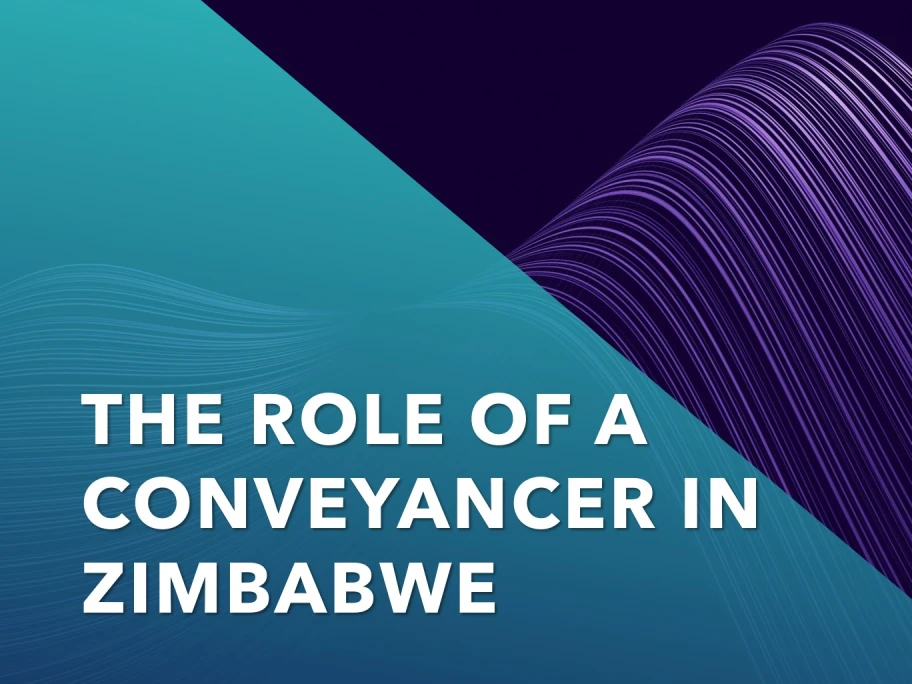Navigating the process of buying or selling property can be a daunting task, especially when it comes to the legalities involved in transferring ownership. In Zimbabwe, the conveyancing process is crucial for ensuring that property transactions are conducted legally and smoothly. According to the Zimbabwe National Statistics Agency, the real estate sector has seen a significant uptick in activity, with property transactions increasing by over 15% in the last year alone. This article will break down the conveyancing process, clarify key terms, and guide you through what to expect when dealing with property transfers.
What is Conveyancing?
Conveyancing is the legal procedure of transferring ownership of land or immovable property from one party (the transferor) to another (the transferee). It encompasses all the necessary legal work and documentation required to finalize a property transaction, ensuring that the buyer receives clear and marketable title to the property. For example, in 2023, a Harare-based couple purchased a residential property, successfully completing the conveyancing process with the help of a conveyancer, which safeguarded their investment and provided peace of mind.
Who is a Conveyancer?
A Conveyancer is a qualified legal professional who specializes in the conveyancing process. Their primary role is to facilitate the transfer of ownership of immovable property and to ensure that all legal requirements are met throughout the transaction. Engaging a conveyancer can save you time and provide peace of mind, knowing that your property transfer is in capable hands. According to a recent survey, 78% of successful property buyers reported that having a conveyancer was instrumental in preventing legal disputes during their transactions.
The Zimbabwean Conveyancing Process: A Step-by-Step Breakdown
1. Due Diligence
Due diligence is a critical first step in the property buying process. It involves conducting thorough searches and inspections before finalizing any property transaction. Buyers must physically inspect the property to confirm its existence and condition and ensure that they are dealing with a bona fide seller. Given the rise of fraudulent property sales in Zimbabwe, which accounted for 30% of property-related complaints last year, it's advisable to engage a conveyancer to assist with due diligence. For instance, a buyer in Bulawayo recently avoided a fraudulent property transaction by having a conveyancer verify the seller’s ownership through a Deeds Office search.
2. Agreement of Sale
Once the buyer is satisfied with the results of the due diligence, they can make an offer to the seller. If the seller accepts the offer, the next step is to draft a sale agreement. This document should detail the subject matter of the sale, the purchase price, payment terms, conveyancer information, risk transfer, occupation dates, party obligations, and dispute resolution methods. In a notable case, a couple purchased a plot in Mutare using a well-drafted sale agreement prepared by their conveyancer, which clearly outlined all obligations, thus avoiding future disputes.
3. Preparing the Transfer Documents
To prepare the transfer documents, the seller must provide the conveyancer with the original title deed of the property. The buyer is then required to pay the conveyancing fees, which are calculated according to a standard tariff. These fees cover stamp duty payable to the Deeds Office and the conveyancer’s fees. The conveyancer will draft the necessary documents for both the seller and the buyer, including Power of Attorney, declarations, and draft deeds of transfer. An average conveyancing fee in Zimbabwe ranges from 2% to 5% of the property's purchase price, making it crucial to budget for these costs.
4. Fees, Rates, and Taxes Clearance
Both parties to the sale agreement must ensure that all outstanding fees, rates, and taxes related to the property are settled before the transfer can occur. The conveyancer will need to lodge the following documents with the Deeds Office:
- Rates Clearance Certificate: This certificate confirms that there are no outstanding council rates or levies on the property, and it must be obtained from the local authority.
- Levy Clearance Certificate: If the property is a flat held under sectional title, this certificate must be obtained from the Flat Owners Association.
- Capital Gains Tax Clearance Certificate: Issued by the Zimbabwe Revenue Authority (ZIMRA), this certificate confirms any capital gains tax liabilities that may be applicable to the seller. Recent data indicates that 45% of sellers experienced delays due to outstanding taxes or fees, highlighting the importance of securing these clearances early.
5. Lodgment & Registration with the Deeds Registry
After preparing the necessary documents, the conveyancer will lodge them with the Deeds Office. If a new bond is being registered over the property or an existing bond is to be canceled, these documents will be submitted simultaneously. The Deeds Office will examine the documents, and upon satisfaction, will proceed to register the transfer by canceling the existing title deed in the seller’s name and issuing a new title deed in the buyer’s name. In 2023, it was reported that over 10,000 properties were registered successfully, showcasing the efficiency of the registration process.
6. Transfer Completion
Once the transfer is successfully registered, the buyer will receive a copy of the registered Deed of Transfer. This document signifies the buyer's legal ownership of the property and marks the completion of the conveyancing process. A recent homebuyer in Gweru expressed their relief upon receiving the deed, stating, "It felt like finally holding the key to our dream home after so much work."
Conclusion
Understanding the conveyancing process in Zimbabwe is essential for anyone looking to buy or sell property. From due diligence to the final transfer of ownership, each step plays a vital role in ensuring a successful transaction. Engaging a qualified conveyancer can streamline the process, reduce stress, and help you avoid potential pitfalls. Whether you're a first-time buyer or a seasoned investor, being informed about the conveyancing process will empower you to make confident decisions in your property journey.
For more information on property listings, legal advice, and the latest real estate trends in Zimbabwe, visit property.co.zw.
 Continue with Facebook
Continue with Facebook
 Continue with Email
Continue with Email














